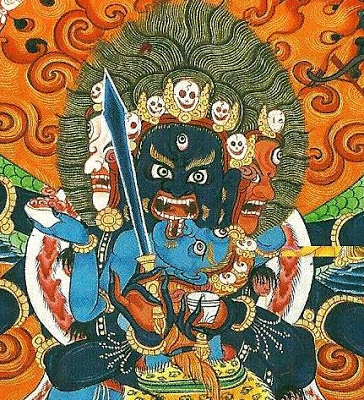Home › Forum Online Discussion › General › Sogyal Rinpoche Dies; Tibetan Buddhist Lama Felled by Abuse Accusations
- This topic has 0 replies, 1 voice, and was last updated 5 years, 5 months ago by
c_howdy.
-
AuthorPosts
-
December 9, 2019 at 2:02 pm #59558
c_howdy
Participant
…a friend of the Dalai Lama’s, he wrote a popular book about life, death and the afterlife that updated “The Tibetan Book of the Dead”…
It’s not possible update this kind of quite complicated Tantras.
His book is nothing else than very shallow philosophical text for lazy and stupid idiots.
Sorry for my broken English.
HOWDY
By Richard Sandomir
Published Sept. 1, 2019Updated Sept. 3, 2019

Sogyal Rinpoche, a charismatic Tibetan Buddhist teacher and best-selling author who abruptly retired after several of his students accused him of multiple acts of sexual, physical and emotional abuse, died on Aug. 28 in a hospital in Thailand. He was in his early 70s.
The cause was a pulmonary embolism, his care team announced. He had received a diagnosis of colon cancer in September 2017.
Two months earlier, his reputation as a popular teacher of Buddhism and longtime friend of the Dalai Lama’s unraveled when eight students wrote a damning, heart-rending letter that outlined allegations of years of abuse by Sogyal Rinpoche against them.
“Why did you inflict violence upon us and our fellow Dharma brothers and sisters?” they wrote, describing incidents that had set him off, like his food not being hot enough, his assistant being inattentive or his girlfriends upsetting him. (Sogyal Rinpoche was not a monk.)
“Your public face is one of kindness, humor, warmth and compassion,” they added, “but your private behavior, the way you conduct yourself behind the scenes, is deeply disturbing and unsettling.”
The letter led Sogyal Rinpoche to step down as the spiritual director of his organization, Rigpa, an international network of Buddhist learning centers, and enter a “period of retreat and reflection.”
The Dalai Lama rebuked him. “Now he is disgraced,” the Dalai Lama said.
Sogyal Rinpoche was born as Sonam Gyaltsen Lakar in 1947 in Kham, in eastern Tibet, and studied under various Tibetan Buddhist masters like Jamyang Khyentse Chökyi Lodrö.
After fleeing with his family to India from the occupying Chinese Army in 1955, he was educated in Catholic and Anglican schools. He left for England to study comparative religion at Trinity College, Cambridge, but did not graduate.
Along the way, he merged the first two letters of his first name and first four letters of his middle name into Sogyal, and took on the surname Rinpoche, an honorific title for lama.
A compelling speaker who was fluent in English, Sogyal Rinpoche taught and gave seminars around the world and wrote “The Tibetan Book of Living and Dying” (1992), a best seller with a foreword by the Dalai Lama.
The book was Sogyal Rinpoche’s effort to update and expand “The Tibetan Book of the Dead,” an ancient religious text. In clear prose, he linked life, death and the afterlife, and detailed a path to enlightenment with meditation, generosity and strengthening one’s karma.
“Our state of mind at the time of death can influence the quality of our next rebirth,” he wrote. “So at the moment of death, in spite of the great variety of karmas we have accumulated, if we make a special effort to generate a virtuous state of mind, we may strengthen and activate a virtuous karma and so bring about a happy rebirth.”
In a review of the book in The New York Times, the religion writer Philip Zaleski praised Sogyal Rinpoche’s “attempts to unriddle life” and wrote that he had delivered a Tibetan version of “The Divine Comedy.”
“One could imagine,” Mr. Zaleski wrote, “that this is what Dante might have written had he been a Buddhist metaphysician rather than a Christian poet.”
The book found a fan in the comic actor John Cleese, who helped narrate the audio version.
“What touches me most greatly about him is his humor,” Mr. Cleese said when he introduced Sogyal Rinpoche at an event in London in 1992. “I thought I could say a few words as a sort of incarnate lama’s warm-up man.”
Two years later, Sogyal Rinpoche had a supporting role as a monk in “Little Buddha” (1994), a film by Bernardo Bertolucci about an American boy believed to be the reincarnation of an important lama. Mr. Bertolucci called Sogyal Rinpoche a “fantastic writer,” in an interview with The Indianapolis Star.And, Mr. Bertolucci said, “He’s so hysterical.”
But that year, a woman who identified herself only as Janice Doe filed a $10 million civil suit in Superior Court in California, accusing Sogyal Rinpoche of sexually and emotionally abusing her. They settled out of court.
More than two decades later, his students’ accusations prompted his organization, Rigpa, to hire a British law firm, Lewis Silkin, to investigate their claims. The investigation upheld much of what they had said and concluded that “senior individuals within Rigpa” had left students at risk by failing to address what they knew of Sogyal Rinpoche’s behavior.
One student told the firm that Sogyal Rinpoche had beaten him more than 200 times over a four-year period. “If he was in a bad mood, he would beat me every day, or more than once a day,” the student was quoted as saying in the firm’s report. After a falling out with a girlfriend, he would “slam the door and punch me in the guts.”
Sogyal Rinpoche declined to be interviewed during the investigation. But in a letter that he sent to the investigator, he did not admit to abusing the students.
“I find it very hard to recognize myself in the descriptions in the letter and the picture that it paints,” he wrote. “It distresses me that my actions and intentions could have been misunderstood and characterized in this way.”
-
AuthorPosts
- You must be logged in to reply to this topic.
